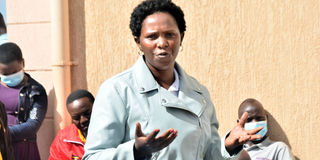Rampant child marriages ruin female athletes in Sebei sub-region

Chelangat speaks to officials and athletes during a visit. PHOTO/GEORGE KATONGOLE
What you need to know:
The Forum on Marriage and the Rights of Women and Girls explains that 'where these elements are linked with gender inequities and biases for the majority of young girls, their socialisation which grooms them to be mothers and submissive wives, limits their development to only reproductive roles.
There has been a reported decline of female athletes coming through the ranks. The trend, according to officials, should be a red flag for the government of things going wrong especially in athletics.
Sarah Chelangat, the administrative Secretary in charge of technical matters at the National Council of Sports (NCS), said many girls’ careers in Sebei are stunted, stressing that it was not accidental.
Chelangat, who has been following the trends on girls’ participation in the Sebei region keenly, says there must be deliberate efforts to allow girls to live longer off their careers.
Citing a catalogue of problems facing female athletes in Sebei, Chelangat said lack of female officials is one of the biggest issues that need to be addressed.
"We don't have even a single female coach, manager or physios. Imagine these are teens and what do you think happens when they are touched by male physios? I know they (physios) are professional but the girls are vulnerable," Chelangat said.
Although Chelangat cited names of girls whose careers have dipped due to the practice of early marriage, which is encouraged in the region, we could not independently verify her assertions.
Complicated
Sports Minister Peter Ogwang, who has been vocal about numerous injustices facing girls in sports, said there should be protocols of protecting children from traditional harmful practices such as teenage pregnancies, sexual and gender-based violence, and harmful practices like child marriages and female genital mutilation.
“We have a new generation of male athletes coming up and we are positive about the Los Angeles Olympics in 2026, but where are our daughters? You should stop marrying children while they are still young. You are killing their careers. God has given them a talent but why do you continue to kill their dreams,” Ogwang said while meeting area sports officials during his tour of the National High Altitude Training Centre in Teryet, Kapchorwa.
The Sebei people traditionally believe in Female Genital Mutilation and early marriages.
Aggressive interventions and mechanisms have seemingly calmed the situation but the practices continue.
Uganda is one of the countries with the highest early and forced marriage. 10 percent of girls are married off before the age of 15 and 40 percent of girls are married off before their 18th birthday, according to a UNICEF report of 2011.
Early exposure to marriage or sex, in particular, has its own price. The young girls become mothers while parenting duties pile up limiting time for training.
“From the reports I gather, the men who marry our girls end up stressing them out. When they get money, you men instead run after other women,” Ogwang said.
Challenges abound
The Sebei, a Southern Nilotic people, live on the northern slopes of Mount Elgon. The herders of Kapsirika and farmers of Sasur are traditionally polygamous and initiate girls early into womanhood as early as 16 years.
Young mothers face higher risks during pregnancies including complications such as heavy bleeding, fistula, infection, anaemia and eclampsia which contribute to higher mortality rates of both mother and child.
The young mothers may be unable to access health services because of distance, fear, expense or the need for permission from a spouse or in-laws. These barriers aggravate the dropout of athletes from competitions.
Child brides may also suffer vulnerability to HIV/Aids. It exacerbates the abilities of girls and women to make and negotiate sexual decisions, including whether or not to engage in sexual activity, issues relating to the use of contraception and condoms for protecting against HIV infection, and also their ability to demand fidelity from their husbands.
The Forum on Marriage and the Rights of Women and Girls explains that 'where these elements are linked with gender inequities and biases for the majority of young girls, their socialisation which grooms them to be mothers and submissive wives, limits their development to only reproductive roles.
“We need to do a lot of sensitisation on mind-set change and we are starting it now. We should have hands-on skills for girls. We must also identify coaches and managers for girls to put on government payroll for husbands to allow the girls to train,” Ogwang added, promising to visit the husband of one of the elite athletes who often refrains her from attending training.
The National Council of Sports (NCS) has offered to meet training needs of female coaches who can handle girls as more efforts are developed.




